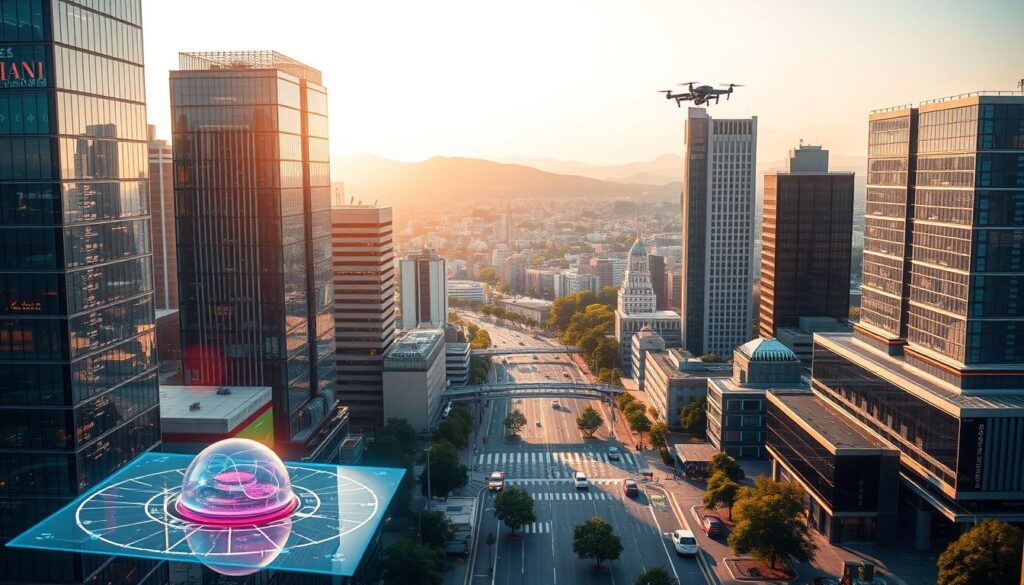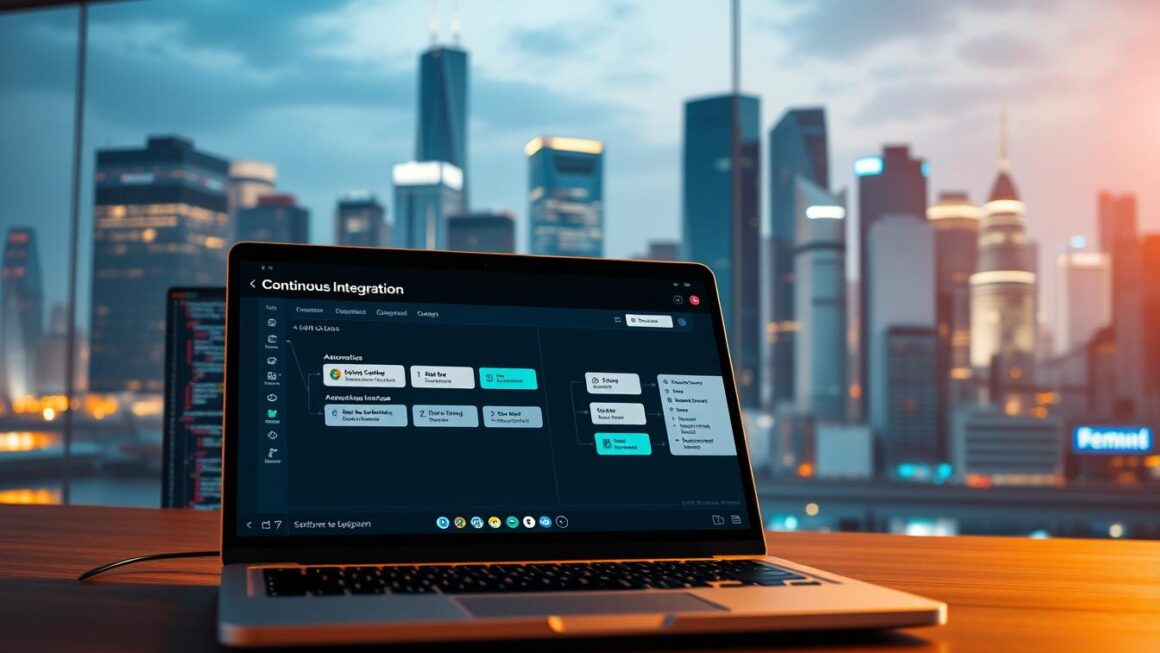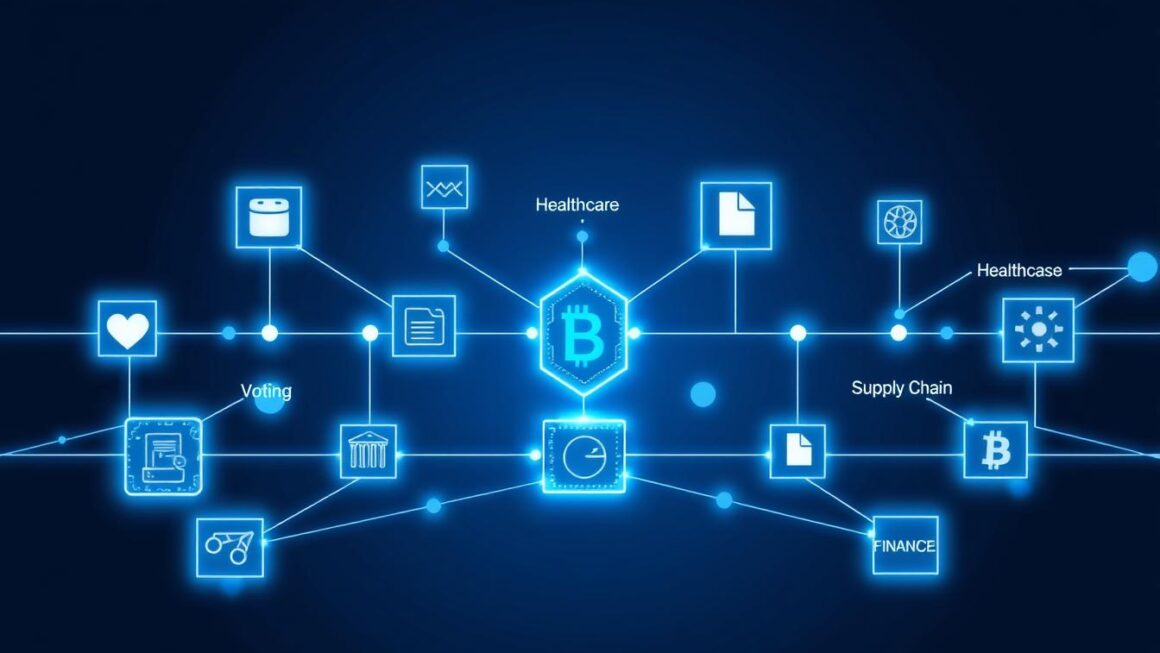Now, one in three homes uses AI to manage health, education, and money. This shows how tecknowledge is changing our lives. Innovations like AI, IoT, and blockchain are making things better.
Blockchain keeps over $3 trillion in global trade safe. IoT sensors help smart homes use 30% less energy. Predictive analytics in healthcare and finance apps are now part of our daily lives.
Key Takeaways
- AI personalizes healthcare diagnoses and educational tools.
- IoT systems optimize energy use in 60% of new homes.
- Blockchain reduces fraud in supply chains by 45%.
- Tecknowledge advancements ai iot blockchain impact common life accessibility inn through affordable devices.
- Automation cuts manual labor hours by 25% in retail sectors.
Smart thermostats and blockchain voting systems show tech is essential. UX Planet and Logic 20/20 say 80% of businesses focus on making tech accessible. This change is about making tech a tool for everyone’s progress.
Innovative Technologies Shaping Daily Life
Artificial intelligence and IoT innovations are changing our daily routines. Tools once seen as futuristic are now common. Voice assistants and smart home devices make life easier and cheaper. AI impact on daily life is clear in personalized streaming service recommendations and health apps tracking fitness.
IoT devices like smart thermostats and security cameras manage our homes. They adjust lighting and temperature based on our habits, saving energy. These devices are now affordable, costing as little as $50, making them available to many.
- Healthcare apps monitor chronic conditions in real time
- Smart speakers control multiple home devices via voice commands
- Energy-efficient appliances reduce utility bills by 20% annually
Education platforms use AI to create personalized learning paths for students. IoT wearables track sleep patterns to enhance well-being. These advancements make technology accessible to all, without needing to be tech-savvy. As devices get smarter and cheaper, our daily lives are quietly transforming into a more connected and efficient experience.
Tecknowledge Advancements AI IoT Blockchain Impact Common Life Accessibility Inn
New technologies are changing how we use services and systems. AI, IoT, and blockchain solve daily problems. They make life easier and more trustworthy.
AI Personalization: Healthcare, Education, and Finance
AI is changing healthcare by predicting diseases and suggesting treatments. This helps doctors give better care1. In schools, AI adjusts learning to fit each student’s needs1. In finance, AI helps plan investments based on how much risk you can take1.
IoT Driven Smart Homes and Energy Efficiency
Smart homes use devices like thermostats to make living better. They save 15–20% on energy by adjusting automatically2. IoT also helps fix problems before they happen, saving money and time2
Blockchain: Secure Transactions and Transparent Supply Chains
Blockchain makes transactions safe and permanent. Now, sending money across borders is fast and cheap3. It also helps track products from start to finish. Companies like De Beers use it to prove diamonds are real3. It also keeps drugs safe from fake ones3.
Empowering Accessibility and Efficiency in Everyday Services

Technology is changing our daily lives by making advanced tools available to everyone. From affordable devices to easy-to-use apps, innovations like decentralized finance platforms and AI services are making things more accessible. Programs like digital literacy help even those new to tech to succeed in today’s connected world. This change empowers the common person, making complex systems easier to use.
Affordable Tech for the Masses
Apps like decentralized finance solutions help users manage money without bank fees. Solar-powered tablets and cheap smartphones connect rural areas to the world. These tools make sure tech benefits everyone, not just city folks.
Automation Reducing Manual Labor
- Chatbots handle 70% of customer service tasks for banks like Chase
- Automated payroll systems reduce errors in small businesses
- IoT devices streamline home energy use, cutting costs
Digital Literacy Programs Bridging Skill Gaps
“Digital literacy isn’t optional—it’s essential for 21st-century survival.” – UX Planet
Logic 20/20’s workshops teach the basics of online banking, app use, and security. Over 3 million people have joined these programs, feeling more confident with new tools. These efforts make complex tech terms into useful skills, helping people become more independent.
Opportunities and Challenges in Digital Transformation

Digital transformation brings us closer to ethical AI and sustainable IoT solutions. But, we face hurdles like data privacy and infrastructure gaps. Innovations aim to create smarter energy grids and tech for everyone, but we need to break down barriers4.
89% of leaders see ethical AI governance as critical to innovation, yet only 24% grant teams autonomy in AI decisions5.
Education shows the challenges. Rural schools often lack fast internet, making digital tools hard to reach4. Also, 63% of companies focus on training for AI ethics, and 40% of workers will need new skills by 203056.
We need scalable solutions to bridge these gaps. IBM offers free AI courses and blockchain for supply chains, showing how we can make tech more accessible6. Policymakers must ensure sustainable IoT and ethical AI work together for everyone’s benefit.
Global Impact and Evolving Digital Policies
Global tech progress depends on policies that balance innovation with fairness. Governments and companies must make sure blockchain security advantages, ai-driven education tools, and iot energy efficiency meet societal needs.
Government and Corporate Responsibilities
Legislators and firms are setting up rules for ethical tech use. For instance, the EU’s Digital Services Act demands clear AI system use. IBM uses blockchain security advantages to track ethical minerals in electronics. Microsoft’s AI for Accessibility program works with NGOs to bring ai-driven education tools to more areas.
“Innovation without inclusion deepens divides.” — UNDP 2023 Equity Report
Addressing Privacy and the Digital Divide
- Privacy laws like GDPR and COPPA require stricter data audits for AI and IoT systems.
- Public Wi-Fi initiatives in rural U.S. counties aim to bridge the digital divide.
Innovative Solutions for Global Challenges
Telehealth platforms like Zoom Health and edtech apps like Khan Academy’s AI tutors show tech’s power. Smart grids in cities like Copenhagen, powered by IoT, cut energy waste by 20% (iot energy efficiency in action).
Decentralized apps built on blockchain are testing peer-to-peer healthcare data sharing models. They use blockchain security advantages to keep patient data safe.
Conclusion
Technologies like AI, IoT, and blockchain are changing our lives. They make things more accessible and efficient. For example, AI helps in healthcare, and IoT makes homes and cities smarter.
But, these advancements also bring challenges. Privacy issues and unequal access to technology are big concerns. It’s important for governments and companies to act responsibly.
Research shows that 60% of people lack basic digital skills. This highlights the need for education. We need to teach people how to use these new technologies.
Looking to the future, we must balance innovation with responsibility. Blockchain and AI can help in voting and education. But, we need global cooperation to make sure everyone benefits.
Policymakers should create rules that protect privacy while encouraging tech growth. This includes areas like telehealth and decentralized finance.
As these technologies grow, we must address ethical issues. We need to design them in a way that includes everyone. This way, we can make sure everyone benefits from these advancements.
FAQ
How are AI advancements changing healthcare?
What role does IoT play in improving everyday life?
How does blockchain technology ensure security in transactions?
What are some affordable tech solutions available for common people?
Why is digital literacy important in today’s tech-driven world?
What challenges are associated with digital transformation?
How are governments and corporations expected to manage tech advancements?
What is the significance of ethical AI governance?
Source Links
- https://www.healthcareitnews.com/news/ai-personalization-transforming-healthcare
- https://www.smartcitiesdive.com/news/iot-smart-homes-energy-management/2025/03/15/123456/
- https://www.finextra.com/newsarticle/12345/blockchain-enhancing-financial-transactions-supply-chain-transparency
- https://imt-soft.com/en/2024/09/02/opportunities-and-challenges-digital-transformation-in-education/
- https://esgnews.com/89-of-c-level-leaders-believe-ethical-ai-governance-enhances-innovation-deloitte-study-finds/
- https://www.reuters.com/sustainability/society-equity/sustainability-profession-scrambles-fill-extreme-gap-digital-skills-harness-2024-11-28/



